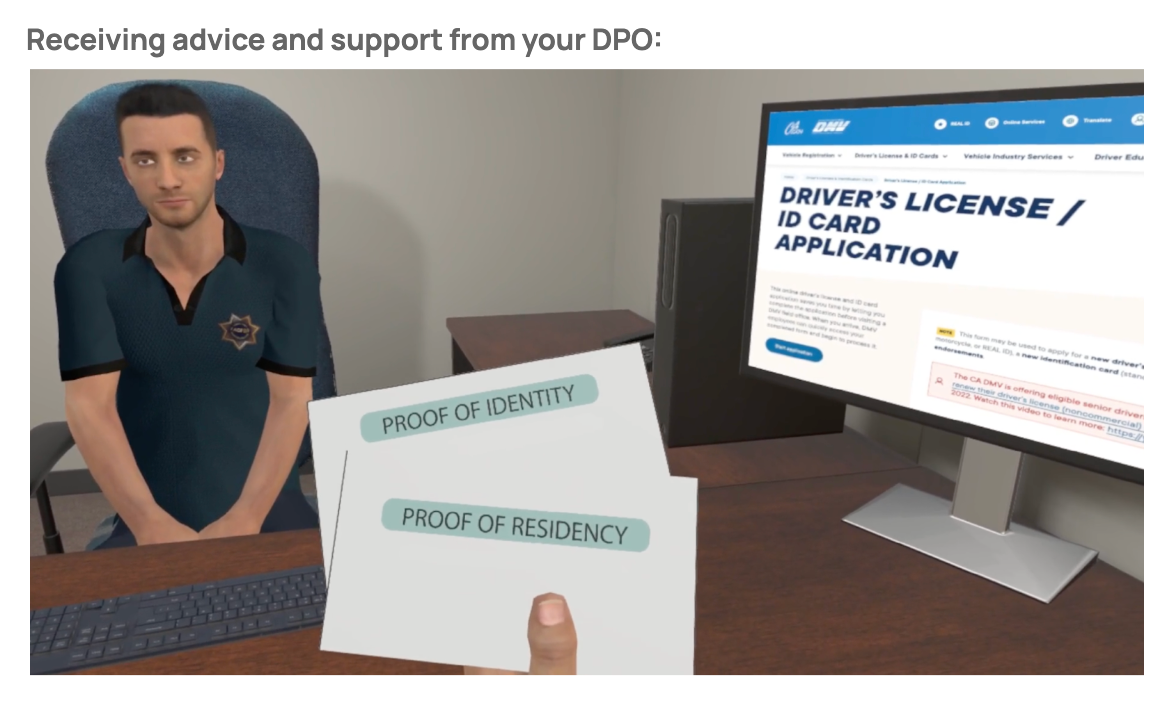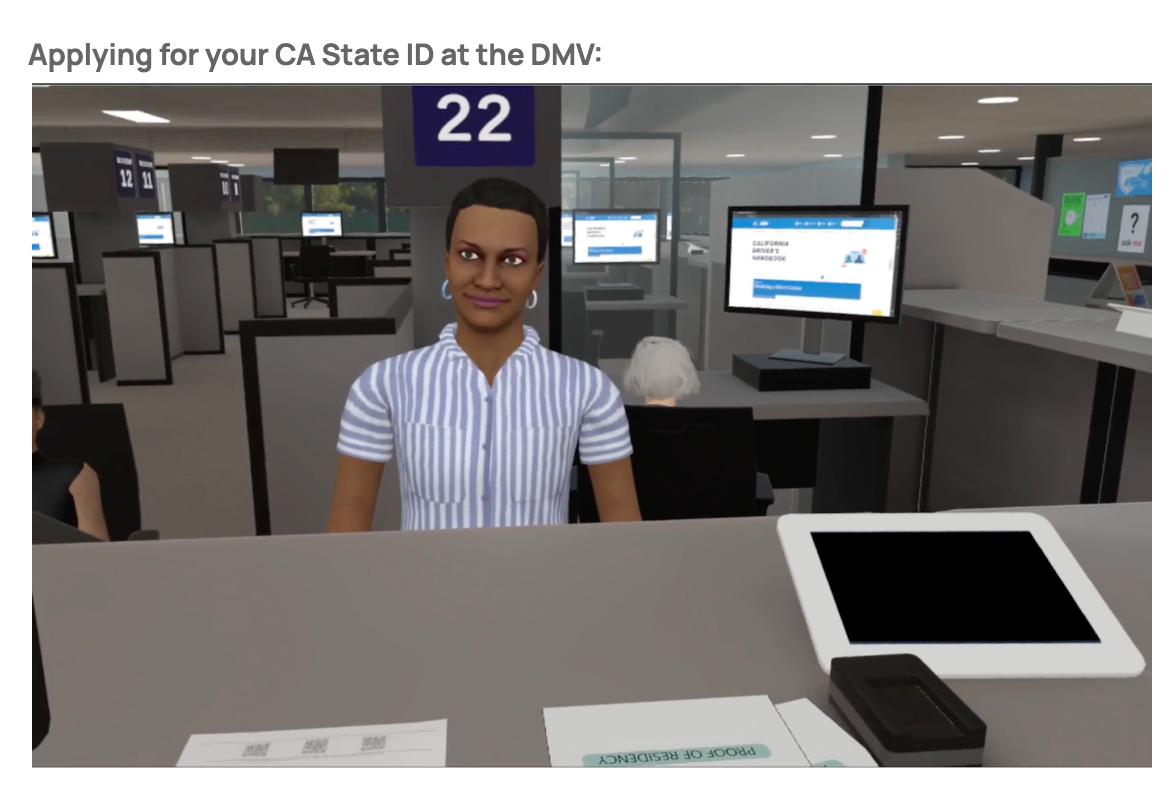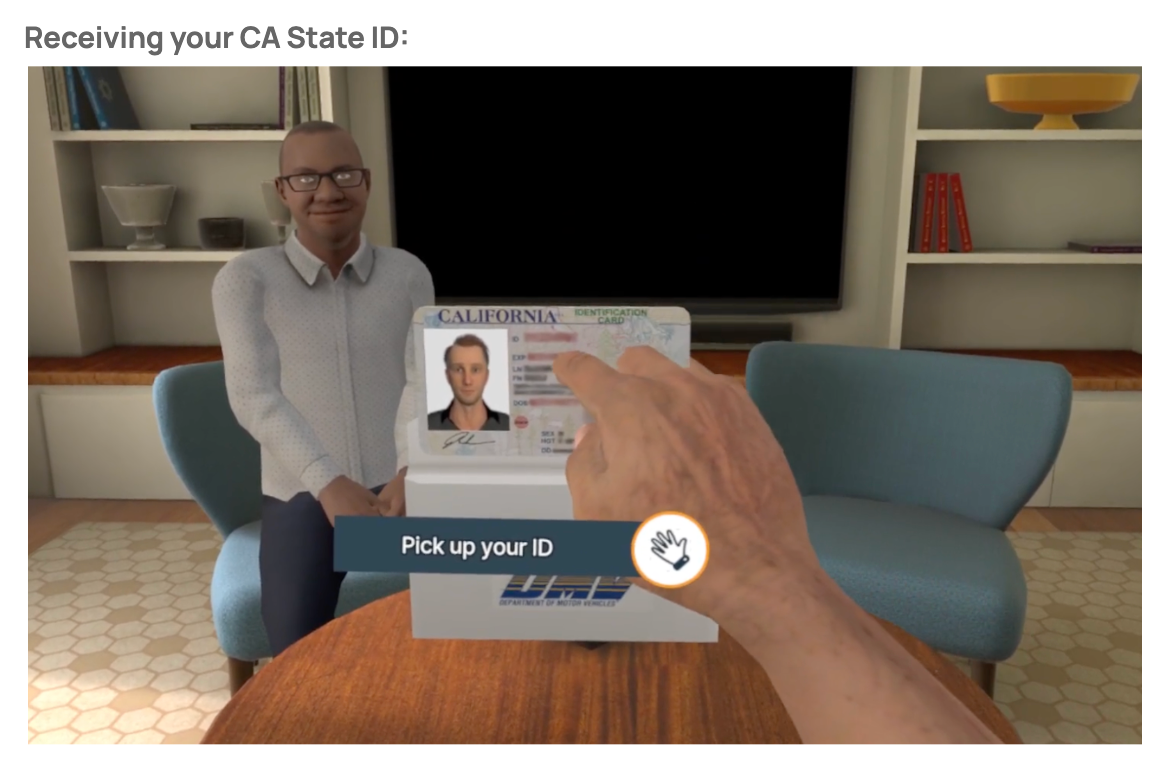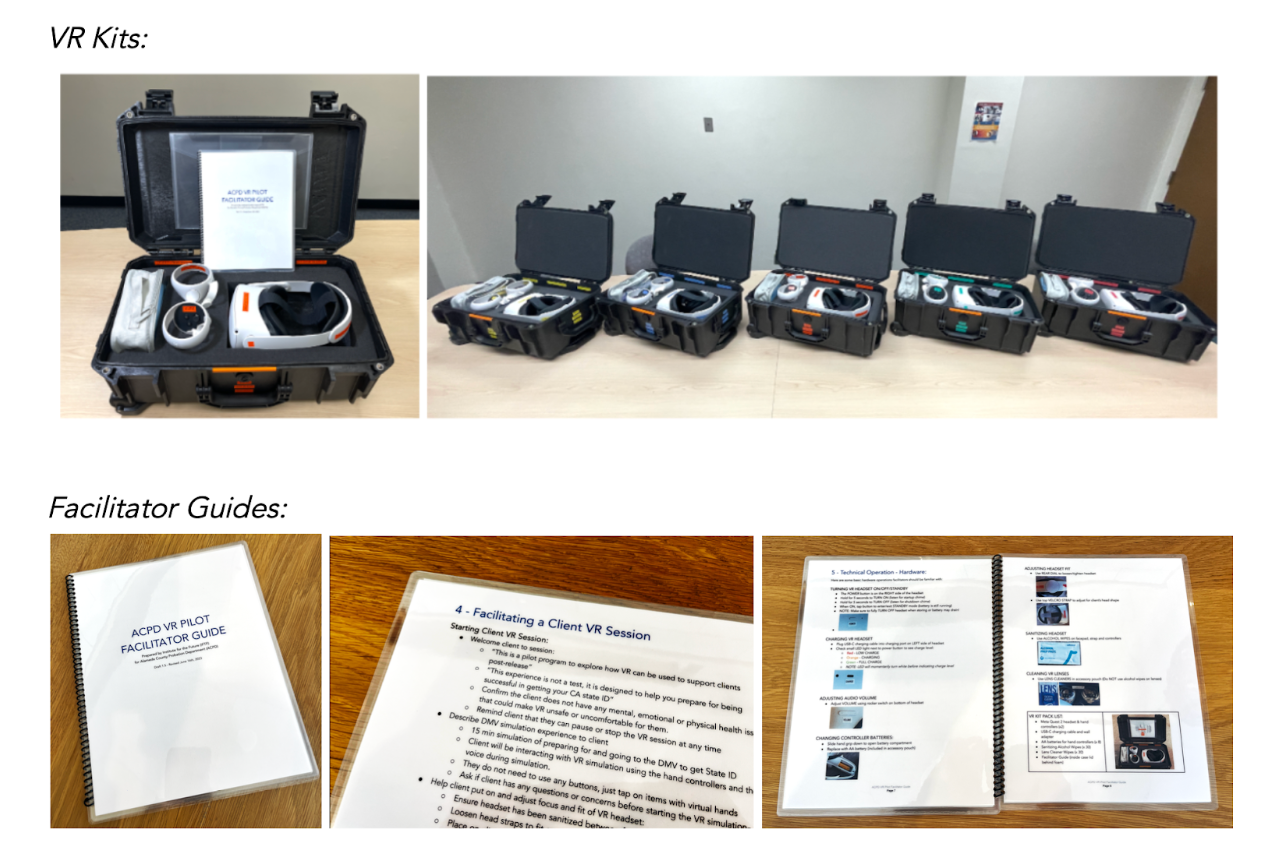The facts are sobering: According to a 2012 report by the California Department of Corrections and Rehabilitation, more than 65 percent of those released from California’s prison system return within three years. Seventy-three percent of the recidivists committed a new crime or violated parole within the first year.
In 2020, The Emerging Media Lab (EML) at Institute for the Future (IFTF) partnered with Alameda County Probation Department (ACPD) to research and develop virtual reality enabled interventions to help ACPD support the success of their reentry clients on their release from incarceration.
This partnership combined ACPD’s innovative approaches to service-based support of their clients, with IFTF’s expertise in futures research and the EML’s focus on human centered design. Funded by a federal grant, the partnership sought to develop new approaches and applications to leveraging the unique immersive, interactive, and embodied affordances of virtual reality to build better futures for individuals in their transitions from prison, as well as new opportunities and tools for the institutions and communities supporting them in their process.
A Service-Based Approach
In the extensive research that informed the development of this VR pilot project, IFTF researchers delved deep into the world of justice-involved populations, the challenges they face, and the systems designed to support them. ACPD’s Chief of Probation, Wendy Still, was nationally recognized for her work in transforming ACPD into a new model of probation that emphasized a service-based approach. IFTF sought to build on this approach by developing a VR pilot program to reflect the needs of ACPD’s clients and support ACPD’s existing client support services. IFTF’s research team conducted over 30 interviews with ACPD staff, clients and support service providers, as well as a variety of external subject matter experts to inform the VR pilot design process with knowledge and considerations critical to developing effective reentry services.
With IFTF’s support, ACPD stakeholders also gained “hands on, heads in’’ experience with a variety of VR technology and content types to build function literacies to help inform their participation in VR pilot development. Through knowledge shares and immersive learning journeys in VR headsets, ACPD stakeholders learned about the unique opportunities for experiential and embodied learning that VR offers, previous VR content and programs developed to support justice-involved populations, as well as experience a range of different types of virtual reality content to develop a nuanced understanding of the design options available in creating VR experiences.
Stakeholder Collaboration
During this initial research phase IFTF gathered data and insights from a wide range of stakeholders, experts, and related case studies, and assembled a team of expert advisors from both within and outside of ACPD to help guide the development of the VR pilot experience. From this extensive research and expert input, IFTF developed several possible VR scenario candidate experiences for ACPD to consider and select the initial pilot experience for IFTF to develop. These proposed candidate VR experiences reflected a wide range of approaches and VR technology options ranging from video orientation tours of ACPD support services and centers, to embodied VR mindfulness programs, to immersive art therapy experiences that used 3D painting tools for clients to reimagine their own personal futures and identities.
The Scenario Design Process
Following extensive discussion and evaluation of the options proposed, ACPD and IFTF decided to develop an interactive VR scenario that would help reentry clients prepare for a critical obstacle that many clients face: obtaining their state ID from the Department of Motor Vehicles (DMV). This task is a critical step in enabling clients to obtain other key support services, from job training, to housing support, to cash assistance, which all require a state ID and many ACPD clients do not have when released from custody. Building a VR simulation would also allow ACPD to pilot a client intervention to leverage the unique immersive capabilities of VR to help clients prepare the logistical steps of obtaining their ID, and the emotional and social challenges of navigating the environment and interactions inside of a DMV office.
IFTF worked with ACPD staff and clients to identify the key learning objectives and obstacles to include in the DMV VR Simulator, and IFTF worked closely with the California State DMV to ensure the accuracy of the processes and the actual environments that clients could expect in their visit to the DMV. IFTF researchers went through the process of obtaining a state ID themselves as well as capturing 3D scans and audio recordings at the DMV to ensure the simulated experience would be as close to reality as possible.
In addition to mapping the DMV processes, human interactions and environments, the DMV Simulator also includes scenes for the client to experience the support services provided by their probation officers and other ACPD staff, such as help with obtaining necessary documents, accessing computers to start their online applications, giving rides to the DMV itself, and even filling out fee waiver forms for clients who cannot afford the DMV ID fees. IFTF’s design of the DVM simulator presents clients not just with the challenges they may face in this task, but also the available support they can leverage from ACPD staff and services.
The DMV Simulator takes reentry clients through several scenes where they meet with both virtual ACPD support staffers and DMV service clerks, and ends with a simulation of receiving their state ID in the mail. This “embodied success moment” where the client not only gets to pre-experience receiving their ID, but also explore the various housing, employment, and cash assistance that the ID unlocks for them, provides incentives and encouragement to apply for their real state ID.




Throughout the process of designing the user experience for this VR simulator, IFTF learned and paid special attention to the principles of trauma-informed service design. While designing the virtual reality experience for populations who have experienced high levels of trauma, both during and prior to their incarceration, it was critically important to ensure the VR experience limited the potential for triggering trauma responses; with experience design considerations, as well as built in comfort and safety protocols that give clients the agency to end the VR experience any time they feel uncomfortable.
In addition to developing the DMV VR Simulation software, IFTF also developed facilitator guides which contained both operational, and comfort and safety protocols to provide clients with a safe and positive experience. IFTF conducted user testing of the DMV VR Simulator and the facilitation protocols with both ACPD clients and staff to gather feedback for revisions and improvements before the launch of the pilot program.
Challenges
Over the course of the 3.5 year long project the VR pilot project team faced many challenges that they needed to overcome. The Covid pandemic and lockdown introduced a number of complications to the project by limiting IFTF access to key ACPD stakeholders and physical locations for the first year of the project. The team was able to bridge some of these gaps using collaborative virtual reality sessions, but it wasn’t until the lockdown had lifted that IFTF was able to conduct the in-person meetings and site visits essential for developing immersive scenarios that were useful and accessible to ACPD clients.
Aside from a global pandemic, piloting new technologies in institutional settings provides a number of challenges from bridging institutional cultures and building literacies in nascent technologies, to the IT and infrastructure challenges of deploying new types of technology within a probation department. But through creative problem solving and cooperation between the stakeholders, the VR pilot program was successfully deployed at ACPD.
Final Output
In September 2023 the IFTF team delivered the final version of the DMV VR Simulator software, loaded onto five specially prepared VR headsets and provided training to four ACPD probation officers who were selected to deploy the VR pilot with clients. An official evaluation will be conducted by ACPD’s evaluation partners at UC Berkeley, and we will share results as they become available. Early informal evaluations by IFTF’s VR development team during user testing of the DMV VR Simulator reported positive user feedback on the usability, clarity, and usefulness of the VR experience.

IFTF’s final summary report to ACPD outlined not only the learnings and insights gained from the partnership, but also identified a range of additional potential application areas for VR to support clients, probation staff, and the wider community of support for client success, which included: additional ACPD support services simulations, ACPD staff empathy and procedural trainings, and pre-release VR applications that could help clients begin preparation for their transitions prior to release.
IFTF is honored and grateful to have been in this partnership with ACPD in helping to lay pathways forward to exploring use cases for virtual reality in support of the reentry process as well as pioneering how government agencies and futures research organizations can collaborate to collectively explore better futures for our civil systems and the citizens that interact with them. William Gibson famously observed “The future is already here, it’s just not evenly distributed” and it is core to IFTF’s mission to help distribute the future potentials that new technologies present to a wider range of participants.
IFTF Foresight Essentials
Institute for the Future (IFTF) is the world’s leading futures organization. Its training program, IFTF Foresight Essentials, is a comprehensive portfolio of strategic foresight training tools based upon over 50 years of IFTF methodologies. IFTF Foresight Essentials cultivates a foresight mindset and skillset that enable individuals and organizations to foresee future forces, identify emerging imperatives, and develop world-ready strategies. To learn more about how IFTF Foresight Essentials is uniquely customizable for businesses, government agencies, and social impact organizations, visit iftf.org/foresightessentials or subscribe to the IFTF Foresight Essentials newsletter.